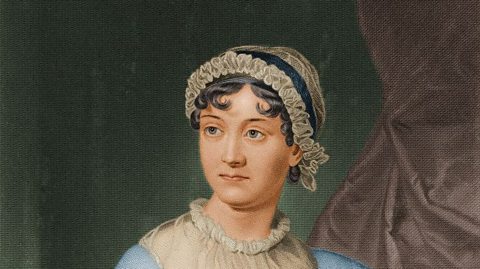Who are the key characters?
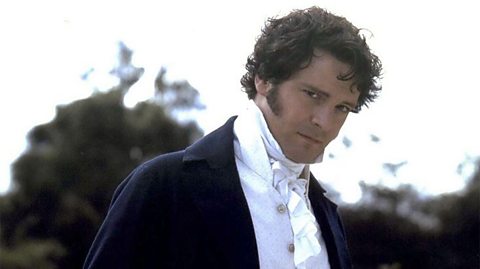
Pride and Prejudice by Jane Austen has two main characters: Elizabeth Bennet and Fitzwilliam Darcy.
Secondary characters include ElizabethвҖҷs older sister Jane, her younger sisters Mary, Catherine (Kitty) and Lydia, Charles Bingley, Mr and Mrs Bennet and George Wickham.
There are many additional secondary and minor characters in the novel, including ElizabethвҖҷs extended family, DarcyвҖҷs friends and family, and other wealthy and socially powerful figures.
All of the characters in the novel are fictional, even though the writer, Jane Austen, based some of the events and settings on her own experiences.


Remember
In your exam, you will be asked to write about a character or a theme. If writing about a character, you should include:
- Key moments for the character
- If and how the character changes throughout the novel
- AustenвҖҷs intentions and message relating to the character
- How a reader might respond to the character.
Elizabeth Bennet
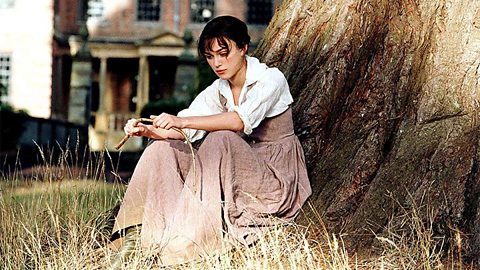
- Independent
- Loyal
- Determined
Elizabeth Bennet, also known as Lizzy, is the heroineThe lead female character in a novel, who has generally good qualities. of the novel. The story is told mainly from her perspective and, despite the fact that she can be stubborn and strong-willed, the reader is encouraged to sympathise with her and hope for her happiness.
Elizabeth has a lively and independent streak. She is quick-witted and playful, with a good sense of humour. Elizabeth takes pride in herself and her identity, and is very clear about what she wants from life: she wants to marry for love.
One of ElizabethвҖҷs strongest traits is her determination. She is determined to speak her mind and breaks the social rules imposed on women by Georgian society when she has to. Elizabeth vows to never agree with or like Darcy, and it takes the majority of the novel for her to back down from this. Elizabeth is also firm with Lady Catherine, despite Lady Catherine being her social superior.
Although she often teases her sisters, she is always the first to offer support and is fiercely loyal to her family.
Some of ElizabethвҖҷs actions reflect her strong sense of pride. For example, she thinks she is an excellent judge of character, but she makes incorrect assumptionsThings that you accept as true without proof or questioning. about Darcy, who she thinks is rude. Her prejudiceAn unfairly negative attitude towards another person or group. means that she stubbornly ignores DarcyвҖҷs good points.

Activity
What evidence could be used to show how ElizabethвҖҷs proud and independent nature is presented throughout the novel?
I am only resolved to act in that manner, which will, in my own opinion, constitute my happiness.
This is an example of ElizabethвҖҷs morals and her sense of self.
Even though she knows it would be sensible to marry for money, she promises herself that she will marry for love and without the interference of other people and their ideas of what happiness looks like.
I could easily forgive his pride, if he had not mortified mine.
This highlights ElizabethвҖҷs independence of thought.
She can see DarcyвҖҷs flaws and potentially look past them, but the use of "mortified" suggests that his rejection has hurt too much for her to forgive him.
My courage always rises with every attempt to intimidate me.
This shows how Elizabeth is determined to defend herself and show others her resilience. The word вҖңalwaysвҖқ emphasises her willingness to keep arguing with and confronting Darcy about his rudeness and behaviour.
Fitzwilliam Darcy

- Proud
- Principled
- Honest
Mr Darcy is a rich, young gentleman who eventually becomes the romantic heroIn literature, a main character who reflects on their actions and who is admired by others. of the novel.
Darcy is initially presented as a very proud man. He is proud of his status and appears to care a lot about social class. Darcy only speaks to people that he already knows, instead of socialising more widely.
He does not want to dance with Elizabeth at the Meryton Ball because he sees that nobody else is dancing with her and so thinks she is not worthy of his attention. He does not apologise to Elizabeth after this, and wrongly assumes that Elizabeth will accept his first marriage proposal.
Later in the novel, Darcy realises the negative effects of his pride, and is willing to put his ego to one side. For example, when he pays off Wickham to avoid scandal for the Bennet family.
Darcy is also principledBehaving in an honest and moral way.: he has clear views and morals, like Elizabeth does. Although he is villainisedTo be unfairly presented as someone who is a villain or dishonest. for trying to distance Bingley from Jane, he does it in the genuine belief that Jane is not in love and is only after BingleyвҖҷs money.
Finally, Darcy is an honest man. As Austen tells the story from ElizabethвҖҷs perspective, this honesty is sometimes viewed negatively вҖ“ for example, his standoffishActing in a distant and cold way. behaviour at the Meryton Ball.
As the novel progresses, DarcyвҖҷs honesty becomes one of his most appealing qualities. He overcomes his social prejudiceAn unfairly negative attitude towards another person or group. to show politeness and genuine interest in the Gardiners.
At the end of the novel, Darcy is sincereSomeone who says what they honestly feel without negativity. and open about his true feelings for Elizabeth. He can articulateTo speak with clarity. what he loves about her, and his honest behaviour throughout the novel means that the reader accepts his words as heartfelt and genuine.

Question
Darcy says:
My good opinion once lost is lost for ever.
Why does Austen repeat the word вҖңlostвҖқ in this quote?
AustenвҖҷs repetition of the word вҖҳlostвҖҷ here has two effects:
- The first is that it emphasises the importance Darcy places on honesty and his trust in his own judgement: there are no second chances.
- The second is that it symbolises DarcyвҖҷs pride and stubbornness, as once he has made up his mind he cannot find a way to go back and start over.
The Bennet sisters
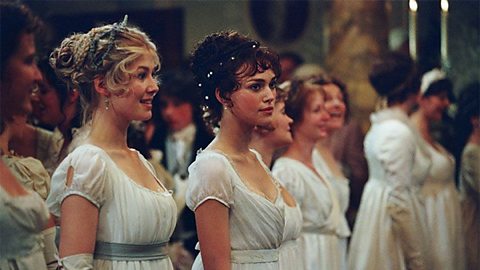
Jane
- Patient
- Generous
At 22 years old, Jane is the eldest of the Bennet sisters. She is important in the novel because Mrs Bennet is keen for Jane to get married to secure her familyвҖҷs future. Jane and ElizabethвҖҷs relationship enables Austen to make contrasts between their attitudes and behaviours.
JaneвҖҷs physical beauty makes her a favourite of Mrs Bennet, and she is patient with her motherвҖҷs schemes to have her married.
An introvertSomeone who is quiet and prefers to spend time alone., Jane is happy to listen to those around her before making a judgement or rushing to action. She is sensible, shy and has to make a great effort to socialise as she finds it difficult.
Jane wants to see the good in others. She falls in love with Bingley for his вҖҳsensible, good-humoured and lively' manners. When in London, Jane waits in vain for Bingley to visit, not knowing that he is unaware that she is in the city.
Later on, Jane shows friendship and kindness to her new sister-in-law Caroline, despite CarolineвҖҷs previous rudeness towards her.

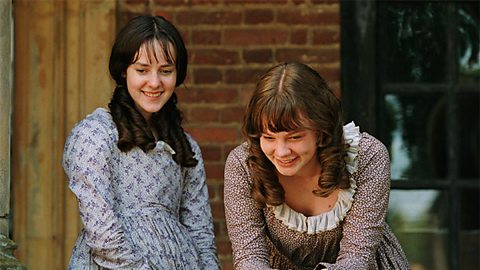
Lydia
- Fearless
- Immature
Lydia is 16 years old and the youngest Bennet sister. She provides another point of contrast to Elizabeth and Jane.
Lydia is not afraid to act impulsivelyActing without thinking. to get what she wants, even if her actions upset others. When she returns to Longbourn after elope/elopedIn AustenвҖҷs context, to run away and get married in secret. with Wickham she acts smugly and with a sense of superiority towards her sisters, even though her actions could have brought shame and ruin to her family.
Lydia is described as being вҖңwildвҖқ and вҖңnoisyвҖқ with a lively temperament that shows she is not afraid of her social superiors.
Lydia is emotionally immature. Like her mother, her interests are in gossip and socialising. She talks about her elopementIn AustenвҖҷs context, running away to get married in secret. with Wickham with no sense of the consequences for the Bennet family, saying вҖңwhat a good joke it will be!вҖқ.
Her actions are often selfish and she is careless with her money. It is suggested that Lydia has not been given much of an education, being described more than once as вҖңignorantUneducated or deliberately unaware.вҖқ. She is one of the few characters who has not changed by the end of the novel.

Catherine and Mary
Catherine, also known as Kitty, is 17 years old and has a close relationship with Lydia. They share several character traits, including laziness and immaturity. However, Catherine does not have the same fearlessness and energy as Lydia and she is often ignored or taken for granted. It is suggested at the end of the novel that she has matured after having some distance from Lydia.
Mary is 18 years old and more serious and socially awkward than her sisters. She spends a lot of time reading but doesnвҖҷt seem to understand a lot of what she has read. Mary has an inflated sense of how intelligent she is: at one point there is the possibility of Mary marrying Mr Collins, but she thinks that he would need to read more and improve himself to be a good match for her.
Mini quiz
Mr and Mrs Bennet
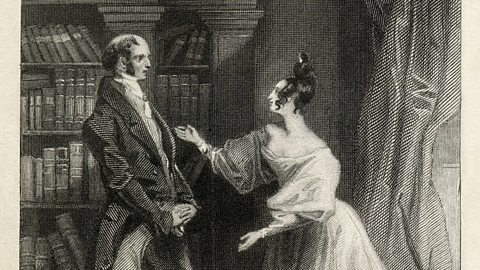
Mr Bennet
Mr Bennet is cynicalNot trusting or respecting the goodness of other people and their actions.about his wifeвҖҷs plans to have their daughters married off. He is irritated by his wifeвҖҷs plotting and the gossipy behaviour of some of his daughters.
Mr Bennet is intelligent, but uses his quick mind to tease others and make sarcastic comments. He has the strongest bond with Elizabeth, who is also quick-witted and intelligent.
At the start of the novel, Austen makes Mr Bennet likeable and funny, but towards the end, Mr Bennet does not act decisively or caringly towards his family.

Mrs Bennet
Mrs Bennet acts foolishly throughout the novel. She is obsessed with her daughters getting married, and this leads her to act in ways that suggest that she doesnвҖҷt understand social etiquetteThe set of rules for polite behaviour in a social group..
Mrs Bennet is often wildly dramatic and behaves immaturely, in a similar way to her daughter Lydia. She speaks loudly and unsubtly about JaneвҖҷs expected marriage to Bingley so that the gossips around her can hear.
Her daughters are embarrassed by her вҖңrepeatedвҖқ and вҖңbitterвҖқ complaints about Mr Collins inheriting the Bennet fortune. The narrator is critical of Mrs Bennet: her long and repetitive speeches are described with mockeryMaking fun of someone or something in an insulting way. and disdainThe attitude that someone else is not worthy of a personвҖҷs time or respect..
As a couple, Mr and Mrs Bennet seem unsuited. Mr Bennet is dismissive of his wifeвҖҷs вҖңnervesвҖқ and her conversations. The reader learns that he married Mrs Bennet for her looks, but his вҖңrespect, esteem and confidenceвҖқ towards her were lost once he got to know her.
In turn, Mrs Bennet is frustrated at her husbandвҖҷs laziness and lack of interest in their children's futures. Mr Bennet makes very little effort on social occasions. When this is combined with Mrs BennetвҖҷs over-excitement, their presentation suggests that ElizabethвҖҷs views on marrying for love may be correct.
Mini quiz
Charles Bingley
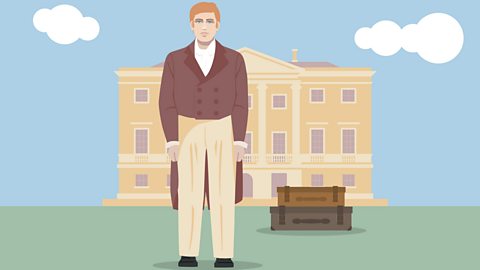
Bingley is the вҖңsingle man in possession of a good fortuneвҖқ who is described in the opening line of the novel.
At first, Bingley seems to be the hero of the novel. His good nature makes him an easy character for the reader to support, though Austen presents him as less interesting than the mysterious Darcy.
Bingley is presented as a suitable match for Jane because of the similarities between them. Their marriage is ultimately presented as solid yet unexciting.

| Bingley's character | Darcy's character |
|---|---|
| Cheerful | Bad-tempered |
| Optimistic | Pessimistic |
| Friendly | Withdrawn |
| Easily influenced | Stubborn |
| Open-minded | Prejudiced |
Mini quiz
George Wickham
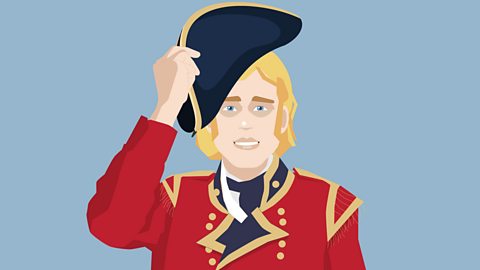
- Charming
- Dishonest
- Selfish
George Wickham can be classed as the villain of the novel. His behaviour is used by Austen to reveal the kindness of DarcyвҖҷs true nature.
Wickham is a soldier who attempts to charm the Bennet sisters. He is convincing: Elizabeth trusts him at the start because she cannot believe that someone so handsome would do anything wrong. He is described as having good manners and he is immediately invited to dinners with the Bennet family and their friends.
However, it soon becomes clear that Wickham is dishonest.
He lies to Elizabeth about his past interactions with Darcy so that he can gain sympathy from her.
It is revealed that Wickham is a compulsiveDescribing a strong desire or addiction. gambler and has tried to escape several debts.
Wickham also lies to Lydia: he gives her the impression that he is taking her to Gretna Green to get married, but instead takes her to London. It is implied that Wickham originally had no intention of marrying Lydia.

19th century context: debt

Image caption, At the time the novel was written, many wealthy gentlemen had accounts with different suppliers, like carriage drivers and shopkeepers. This meant that they often owed money to many people, though their attitudes to paying were very relaxed as they rarely carried cash.
Image caption, Although gambling with large amounts of money was illegal in the early 1800s, it was still very popular. Police ignored most gambling as it was often well-connected gentlemen who were placing bets. Unlike accounts with traders, gambling debts were expected to be paid immediately. Moneylenders had a presence in upper-class private clubs to help gentlemen pay for their losses.
Image caption, Wickham running away from his debts, and his gambling debts in particular, means that he would be seen as dishonourable and untrustworthy. Wickham has lost most of his familyвҖҷs money, but keeps betting to try and get richer. When Darcy pays Wickham, he pays off all of his existing debts, buys Wickham a new role in the regiment, and also gives him enough money to live comfortably with Lydia.
1 of 3
Other characters
Other characters that you need to know about are: William Collins, Lady Catherine de Bourgh, Caroline Bingley, Charlotte Lucas and Georgiana Darcy.
Who is William Collins?
William Collins is Mr BennetвҖҷs cousin and he is set to inherit Longbourn. He is a very proud man with high self-esteem.
He is in awe of Lady Catherine, who prompts him to propose to at least one of the Bennet sisters. He is surprised by ElizabethвҖҷs rejection, but swiftly moves on to Charlotte in a businesslike way.
Austen presents Collins as a figure of fun and ridicule.
Who is Lady Catherine de Bourgh?
Lady Catherine de Bourgh is DarcyвҖҷs wealthy aunt. Her social and financial superiority leads her to act in a haughtyActing in an arrogant and superior way. and pompousActing in a way that shows you think you are better or more important than other people. way towards most of the other characters. She is rude to those that she considers to be beneath her, and does not hesitate to interfere in other peopleвҖҷs relationships.
Lady CatherineвҖҷs confrontation with Elizabeth over Darcy shows her condescendingTreating someone as if you are more important or more intelligent than them. and sometimes petulantActing in an angry, childish way. behaviour when she does not get her way. Her desire for Darcy to marry her daughter, Anne, is just a way to reinforce her social status.
The exaggerated portrayal of Lady CatherineвҖҷs own self-importance makes her another comic character.
Who is Caroline Bingley?
Caroline Bingley is Charles BingleyвҖҷs sister. She is selfish and hypocritical, and follows strict social rules. For example, her attempts to dissuade Darcy from pursuing Elizabeth are because of the Bennet familyвҖҷs lower social status.
She is initially friendly towards Jane, but changes her attitude completely when Bingley is linked to Jane because she wants him to marry DarcyвҖҷs sister Georgiana instead.
Caroline later apologises for her behaviour and renews her friendship with Jane.
Who is Charlotte Lucas?
Charlotte Lucas is ElizabethвҖҷs close friend.
Even though she and Elizabeth are similar in their intelligence and sensible attitude, Charlotte is more pragmaticDealing with things sensibly and realistically.. She sees marriage as an economic transaction, describing marital happiness as вҖңa matter of chanceвҖқ. This means that her acceptance of CollinsвҖҷ proposal is understandable to the reader, even though it is not to Elizabeth.
Charlotte is careful in her judgements and actions, thinking more calmly than many of the other characters.
Who is Georgiana Darcy?
Georgiana Darcy is DarcyвҖҷs younger sister. The age gap between them means that she sees Darcy as more of a father figure than a brother.
She is described as sweet and shy. Georgiana is also presented as honest and ІФІ№ГҜұ№ұрDescribing a person who lacks life experience and then makes poor judgements.: when we hear the story of how Wickham attempted to primogenitureA legal arrangement that means that wealth must be inherited by a son or male relation. with her, it is clear to the reader that Wickham was planning to steal GeorgianaвҖҷs dowryAn amount of property or money given from the brideвҖҷs family to her husband on their marriage. and he had made her believe that he was in love with her. When Darcy finds out about the plan, Georgiana immediately confesses as she is overcome by guilt.
At the end of the novel she forms a close sisterly bond with Elizabeth.
Question
Austen uses a large number of minor characters in the novel. Why?
Answer
The minor characters in Pride and Prejudice all serve a function in the novel.
The main reason for their existence is that they help Austen to construct the complex social world that the Bennets live in. Each character shows a different side to that world, as their motivations, finances and backgrounds vary.
Each time a minor character is introduced there is a plot development or a chance for one of the other characters to make a change.
The fact that the minor characters are all connected in some way also highlights the close-knit and pressured environment of upper-class Georgian society.
Quiz
Test your understanding of the characters in Jane Austen's Pride and Prejudice by taking this quiz.
More on Pride and Prejudice
Find out more by working through a topic
- count3 of 5
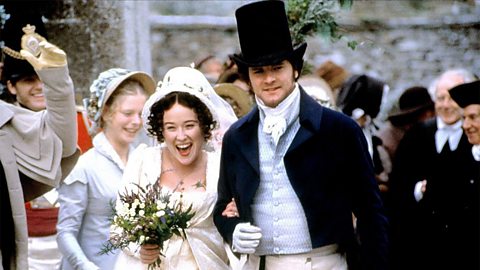
- count1 of 5
